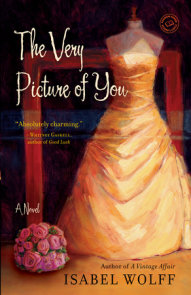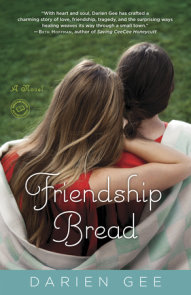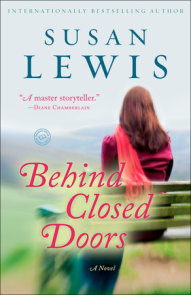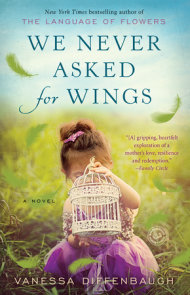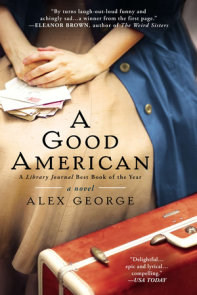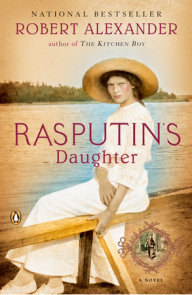READERS GUIDE
A Conversation Between Lori Nelson Spielman and Meg Waite ClaytonMeg Waite Clayton is the nationally bestselling author of The Four Ms. Bradwells, The Wednesday Sisters, and The Language of Light, all national book club picks. Her latest novel, The Wednesday Daughters, is available now from Ballantine Books.
Meg Waite Clayton: Can you tell us a little about what sparked the idea for The Life List?
Lori Nelson Spielman: One day I came across an old cedar box, and tucked inside was the life list I’d written over thirty years ago. Many of the goals could be checked off. I’d made my high school cheerleading squad. I’d graduated from college and learned to ski and traveled to Europe. I had a good marriage . . . I even had a cat. But I didn’t live on a lake. I hadn’t designed my own home. I didn’t have two kids, or a horse, or a dog. As I read the list, I thought about how different my life would be if I’d fulfilled every goal my fourteen-year-old self longed for. I love stories where someone dies and leaves a message to their loved one, like P.S. I Love You by Cecelia Ahern or Message in a Bottle by Nicholas Sparks. So what if someone died, and left an old life list for their loved one to complete?
In the course of several days, my story evolved. First, I came up with riddles from a dying mother, offering her daughter cryp- tic clues to find her true self. But that was silly. Why the riddles? Why wouldn’t her mother just tell her daughter what she wanted her to accomplish? And it was crucial that the mother didn’t appear heavy-handed or controlling. The story could only work if it was clear that the mother’s intentions came from a loving heart. I also knew the story risked being predictable. I imagined readers rolling their eyes, sure that in the end, Brett would be married to the love of her life and have a baby and a dog and a horse. I didn’t want Brett to accomplish her goals easily, or in a conventional way the reader might expect. I wanted some goals to lead to others, in a circuitous, serendipitous way.
MWC: Was writing a novel on your life list?
LNS: I wish I could say yes. But like Brett’s, my goals were very humble. As a child and teen, the idea of becoming a writer never once occurred to me. In my middle-class neighborhood in my middle-class town, I’d never met a single novelist. Novelists lived in New York City, or in glass-walled houses overlooking the Pacific. As I headed off to college, my mother—who naturally as- sumed that her daughter who loved dolls and babies would eventually have a house full of children—suggested two career choices. “A teacher or a nurse,” she said. “Both are good jobs for a mother.” I got really crazy and chose to become a speech patholo- gist! In my coursework, I opted to get my teaching certification as well. And though I enjoyed the profession of speech and language pathology, it never fully satisfied my creative yen.
MWC: How did your passion for writing develop?
LNS: I’m convinced that my love for storytelling spawned from my early days of playing Barbies. As a child, the only thing I loved more than my Weekly Readers and Encyclopedia Brown books were my Barbie dolls. My sister, Natalie, and our friends—usually Cathy or Michelle—would sit on our bedroom floor with our chosen dolls, creating plot and character and dialogue. Though we weren’t aware of it then, we were storytelling. Each play session was wrought with conflict and drama. We chose different settings—sometimes a beach, other times an amusement park or fancy department store. And when the pace slowed or the plot unraveled, we’d pack up our plastic cases and call it a day, only to return the following day with a fresh story to enact.
Eventually I outgrew Barbies, but I still longed to tell stories. While babysitting, I made up tales about a group of kids and their babysitters from hell. Before long, the stories became known as The Janet, Edgar, and Alice Stories, loosely based on a wacky babysitter I’d had as a child. The kids couldn’t get enough of them. I was forced to make up stories on the spot, which was a terrific exercise.
Throughout my school years, English was my favorite subject. I loved reading, writing, and poetry. It was in Mr. Chapman’s creative writing class that I got my first dose of critical acclaim. It was a short story about a young woman’s devastating breakup with her cheating scum of a fiancé and her budding rebound romance with Mr. Perfect—all of which took place within a span of two days! (What can I say? I liked fast-paced stories, even then.) Across the front of the paper, Mr. Chapman wrote “Adequate handling of dialogue.” That was it. But his lack of enthusiasm didn’t faze me because my girlfriends—the people who really mattered—loved the predictable, clichéd story. Carole read it first, then passed it to Sherri, who passed it to Linda and Cindy. It circulated between classes faster than a chemistry quiz cheat sheet. I was intoxicated.
MWC: Did you have a favorite character in The Life List? Were any of them particularly hard to write?
LNS: I loved Brett, and what surprised me was that I loved writing Brad, too. I’d once written a manuscript with a male protagonist, and never really connected with his voice. Brad was much more accessible to me, and felt completely authentic. But as much as I loved Brett and Brad, I loved writing Elizabeth even more. It seems strange, since Elizabeth has already died when the book begins and we never actually meet her. But I felt such affection for this woman. She came to me so vividly; all I had to do was “listen” to her and type her words. It was tricky writing Garrett because I needed the reader to believe, as Brett did, that he was sixty-something—but still cool enough that Brett could fall for him. I’d say Andrew was the hardest to write because I had a tendency to go overboard with awfulness. During rewrites I made him less of a jerk, believe it or not. I worried that readers would have had a hard time figuring out why Brett would spend four hours with the guy, let alone four years.
MWC: I loved the relationship between Brad and Brett, and found myself longing for them to connect. Can you talk a little about why you took them in a different direction?
LNS: I was tempted! But as I mentioned, the story risked predictability. Though I loved Brad and thought he and Brett would be a great fit, it was just too easy. And as we all know, love is never easy! In the original draft, Brad was gay. Brett didn’t realize it until she showed up on his doorstep New Year’s Eve. In a bold attempt at bravery, she confessed her love to him. He hugged her, in that brotherly way she mistakenly thought might be something more. Then the front door swung open and a man appeared— clearly Brad’s partner. Humiliated, Brett dashed from the house, similar to the scene in the final draft. But my agent thought this was too much of a shock. The two had grown so close over the months, so why wouldn’t Brett have known he was gay? And she was right.
MWC: What other changes did you make along the way?
LNS: While Brad was gay in the first draft, Carrie was straight. Problem was, I never had a truly convincing reason for Brett and Carrie’s falling out. Once I made Brad straight (yes, I actually possess that power!), I decided Carrie would be gay, providing a reason for the teenage Brett to have ended their friendship—and later realize how wrong she’d been. Another difference was that the original manuscript opened with Brett finding her mother’s medical marijuana rather than the champagne. Her mother attached a note to it, just as she did with the champagne. Brett was high rather than tipsy when Catherine found her. But as my brilliant agent pointed out, getting high seemed inconsistent with Brett’s character. The big challenge was to come up with a poignant funeral luncheon scene where Brett still receives a message from her mother and ends up doing something foolish. I really struggled with the champagne. I mean, who hides a bottle of champagne in their bedroom? In the end, I hope it seemed plausible.
MWC: Did you create a detailed outline before beginning your novel, or did you let the story take shape as you wrote?
LNS: I had a whisper of an outline, but the story was mainly in my head. I knew how I wanted it to end, which I think is impor- tant in storytelling, but there were a lot of surprises along the way. And when I arrived at the final pages, I almost changed my mind on the ending. Brett had come so far, and had accomplished almost every goal—except for the gargantuan feat of falling in love. I had always planned that she would find her love in the end, but suddenly it occurred to me that it might not be necessary. In fact, it might be better if she didn’t. I channeled my inner Gloria Steinem, loving the message it would send to women and girls— you can be happy and fulfilled without a man in your life. And I know plenty of single women who are. Brett’s heart-stopping, I’d-die-for-you love was her baby, and she was perfectly content. But then the romantic in me thought, “Nah. Single life is all fine and good for other women, but Brett needs to end up with Garrett.”
MWC: The way you deliver the relationship between Brett and her mother is just wonderful. Is it based on your relationship with your own mom? (And if so, can I borrow her?)
LNS: Thank you, Meg. I’m extremely lucky to have a wonderful relationship with my mother, who is still very much alive and healthy. And yes, the book has glimmers of my mother and our relationship woven throughout the pages. But no, she did not own a multimillion-dollar cosmetics company—unfortunately! And unlike the man who raised Brett, my dad was and continues to be a wonderful, loving father. Because I never had children, Elizabeth is the mother I can pretend I would have been!
MWC: Until I read your book, I’d never heard of a homebound teacher. Please tell us a little more about your job.
LNS: You’re not the only one, Meg. I hear that all the time. Actually my homebound teaching job is very much like I described it in the book. When students are sick—mentally or physically— I gather their work from the school and take it to their home or the hospital. It’s such a privilege being invited into someone’s home, where the teaching is one-on-one and relationships can be formed with the families. Just as it happens in the story, I’m able to glimpse a slice of life I wouldn’t normally be privy to, sometimes heartwarming, sometimes heartbreaking. I’ve had terminally ill students whose joy and enthusiasm for life humble me. Many of my students are new mothers—sometimes as young as seventh grade. I once had a student who wanted me to adopt her new baby. I’ve taught prickly students like Peter, who are homebound for disciplinary reasons. And even though it’s sometimes unnerving arriving at a house for the first time, especially in a neighborhood that seems questionable, the students are almost always wonderful in the comfort of their own home.
MWC: Andrew and Megan turned out to be pretty sketchy characters. Can you provide any insight as to what they’re up to now?
LNS: This is an example of one of those surprises that caught me off guard when writing. I fully expected Megan and Brett to be friends until the end. But then Andrew came home unexpectedly with another woman. Hidden in the dark confines of his kitchen, Brett waited while he grabbed the bottle of scotch and dashed upstairs with the woman. I was as shocked as Brett when I “saw” that the woman was Megan! And it made sense. Megan was on the hunt for another man, and thought Andrew just might fit the bill—and pay the bill!
What they’re up to now . . . well, they’re no longer together. Yup, that’s a real shocker, I know! Megan was appalled at how stingy Andrew was. I mean, what’s the use of dating a rich attor- ney if he won’t spend an f-ing dime? Now she’s seeing a retired investment banker. Oscar treats her like a queen, and together they share a sumptuous apartment in the Trump Tower. Her only problem is Oscar’s forty-three-year-old daughter, Felicity. Felicity is convinced Megan’s only after her father’s money. Imagine that! And Andrew? He is still alone, quietly lamenting the loss of Brett, though you’ll never hear him admit it. But recently he saw a spread in the Tribune, featuring the opening of Sanquita House. It was then that he realized their breakup might have been for the best. Seriously? The woman spent her inheritance on a home- less shelter? That sure as hell wouldn’t have happened on his watch.
MWC: Elizabeth went to great lengths to ensure Brett’s future. Is there a reason she didn’t do the same for her boys?
LNS: Like many mothers, Elizabeth’s relationship with her daughter was clearly different from her relationship with her sons. Joad and Jay were firmly established. They had spouses and careers. Because Brett was still floundering, Elizabeth took it upon herself to guide her trajectory. And just imagine if she’d left a note to Shelley and Jay saying, “Jay and Shelley, you just inherited enough money to last a lifetime . . . and then some. Jay, I’d suggest you quit your job at the university and stay home with your children. And Shelley, darling, you keep working.” Talk about a meddling mother-in-law! I’m guessing that might not have gone over big with Jay or Shelley. Elizabeth was wise enough to know when to voice her feelings and when to keep quiet. She had complete faith that Jay and Shelley would work things out for themselves through trial and error. And though Joad and Catherine led an untraditional life without children, Elizabeth realized that it worked for them. It was only Brett’s life that troubled Elizabeth, knowing that Brett had drifted so far away from the woman she was capable of being.
MWC: Deceit/infidelity is one of the themes of the book. Elizabeth had an adulteress affair with Johnny that resulted in Brett’s conception. Yet we forgive Elizabeth. How hard was that to manage?
LNS: Infidelity is never easy to justify, so this was tricky. The fact that Charles was so unemotional and remote makes us less sympathetic toward him. And Elizabeth is such a fine woman, not at all promiscuous. She was emotionally estranged from Charles, and Johnny’s love, however wrong it may have been, filled that void. I think her solitary, selfless life makes it easier to forgive her, to be glad that she had one glimpse of real love and happiness during that summer of 1978.
MWC: Brett is thirty-four years old when she finally goes after the goals she wrote at age fourteen. Is there any significance to these ages?
LNS: I chose fourteen in part because that was the age I wrote my life list. I also think fourteen is a pivotal age, that sliver of time between childhood and womanhood. Sadly, what we gain in maturity is often offset by a loss of confidence. I was a high school guidance counselor for eight years, and it was always sad for me to witness the students’ gradual loss of dreams—especially my female students. I’d have girls come see me their freshman year full of hope and confidence. They’d tell me they were going to be doctors, lawyers, astronauts. But for many of them, some- thing shifts in those next four years. They lose their mojo. I hate to say it, but all too often it was a boyfriend who changed them. I saw girls morph into the person he wanted her to be, and forget their own dreams. Now, I’ll see my old students—these same girls who had big dreams—working at a local convenience store, having forgotten all about that young girl with big dreams. At fourteen we dare to dream of things that at thirty-four we have abandoned.
And Brett was no different. As she grew older, she exchanged her dreams for Andrew’s, and convinced herself she was okay with that. Someone once said, “In her thirties, a woman tries to correct all of the mistakes she made in her twenties.” And in addition to the chaos of making those changes, women face the ever-present biological clock, which seems to run faster and faster when we approach our fourth decade. There’s a sense of urgency in our thirties—it’s sort of the last chance to get it right. Brett felt that urgency, along with a crippling fear of being alone for the rest of her life. Sadly, I don’t think these fears are all that uncommon.
MWC: At times it’s difficult to tell whether Brett loves her sister-in-law Catherine, or abhors her. Can you tell us how you developed this complicated relationship?
LNS: Maybe it’s just me, but don’t we all have that one person (or two or three) who intimidates us, intentional or not? Someone who is smart and confident, who never has a chipped nail or a coffee stain down her blouse? Catherine was everything Brett felt she wasn’t—and it didn’t help that Catherine did little to boost Brett’s confidence. In one scene Brett wondered, “Couldn’t Mom see that with time, I could have developed into a Catherine?” Of course Brett could never become the no-nonsense, officious per- son that Catherine was. And we love her all the more for her flaws and shortcomings.
MWC: What kind of books are you drawn to?
LNS: My taste in books is as variable as my taste in music or food. Sometimes it just depends on what I’m in the mood for. In general, I love dramatic stories involving family conflict and personal struggle. Some of my favorites, in no particular order, are John Steinbeck’s East of Eden, Pearl S. Buck’s The Good Earth, Betty Smith’s A Tree Grows in Brooklyn, Irwin Shaw’s Rich Man, Poor Man, Kent Haruf’s Plainsong, Ken Follett’s The Pillars of the Earth, Kathryn Stockett’s The Help, Edith Wharton’s Ethan Frome, friendship, like your books, Meg, or Maeve Binchy’s novels.
MWC: If Brett could have one last conversation with her mother, how might it go?
LNS: Ah, how Brett would have loved this opportunity! And Elizabeth, too. Clearly, the conversation would vary greatly, depending on the time frame. In the novel, I never got a chance to share the letter Brett received from Elizabeth after achieving goal number 17, fall in love. I think she might have written something like this:
Dearest Brett,
I cannot express how much comfort it gives me to know that your smile is finally genuine, your heart finally full. Yes, you thought you loved Andrew, and perhaps you did, in your own way. But how different that love was from the love you now hold in your heart. Finding a life partner is the single biggest decision one makes in their lifetime, and I simply couldn’t stand idle while you made the wrong decision.
And you wouldn’t be the first to make the mistake. I’m amazed that the cornerstone of our lives is so often treated with frivolity. Perhaps we become impatient or jaded, we feel unable or unworthy. For whatever reason, we decide love isn’t the wellspring of our joy. I’ve witnessed many women— men, too—who rationalize that their jobs, their lifestyle, even their children can provide the fulfillment that is lacking in their relationship. I was guilty of it, too, my dear. You know that now. But how thrilled I am to know that you have found your love at last, that you didn’t compromise.
Treat love as the treasure it is. Never take it for granted; never fail to give thanks. And please know, I had no doubt you’d find your treasure. You have too much love in you, my dear daughter, to be left without.
Wishing you, and your love, love. Mom
Questions and Topics for Discussion
1. Have you ever created a life list of your own? Like Lori and Brett, were you lucky enough to come upon it later in life and if so, did you find anything surprising? Have you managed to accomplish the majority of your childhood aspirations? How would your life be different if you’d completed your list in its entirety? After reading this book, are you in- spired to revisit and even attempt to realize some of those early goals?
2. Frustrated and discouraged by her mother’s final wishes, Brett exclaims, “Life as I know it has just been shredded! And I’m supposed to piece it back together in a way that some— some kid wanted it to be?” Yet Elizabeth was sure all along that Brett would emerge as a happier, more contented woman if she did a major overhaul of her life. Do you think the goals we make as children are still valid into adulthood? Would people generally be better off getting back in touch with the things that mattered most to them as adolescents as opposed to the things they think matter most as adults? Is the shedding of our childhood fancies a necessary aspect of growing up, or might we be forsaking a fundamental piece of ourselves in the process?
3. The meaning of family and heredity is a major theme throughout the novel, especially in terms of how the characters view their relatedness. At one point, Joad refers to Brett as Elizabeth’s “illegitimate daughter,” while he feels disconnected from Austin because she doesn’t look like the rest of the family. Meanwhile, Brett grapples with her own issues of paternity concerning Johnny and Charles, which mirrors their sense of affinity, or lack thereof, for her. How would you say family— real family, as the characters struggle to define it—is distinguished within the context of this novel?
4. Elizabeth implies, and Brett eventually realizes, that she abandoned much of the courage and self-assurance she possessed as a girl to strive for acceptance in the eyes of men. The author herself has said that as a guidance counselor, she has observed this trend manifest in the lives of many girls, who start out with lofty goals only to forsake them in their relationships with the opposite sex. Do you think this is a common occurrence among women? Are there other female characters in the novel who have fallen victim to this unfortunate trap, or if not, how have they managed to avoid making the same mistake?
5. Brett’s relationship with Jean Anderson, the director of the Joshua House, proves to be quite an eye-opener for her, with Jean adding a dose of grim reality to the naïve, wide-eyed way that Brett has of looking at the world. Discuss how Brett’s worldview evolves from the beginning to the end of the novel and the other characters that play a part in this. As Brett asks herself, do you think ending her relationship with Mr. Right in hopes of finding Mr. Absolutely Right was courageous, or merely due to stupidity, immaturity, or arrogance, or perhaps a mix of them all? Do you think the spark that Brett felt was missing with Herbert is absolutely necessary in a relationship?
6. Do you think people commonly resist making difficult changes in their lives unless forced to, as Brett was? How do you tackle the obstacles in your own life that might prevent you from arriving at a positive outcome?
7. Motherhood is a central focus in this story. Interestingly, though, Elizabeth, the foremost maternal figure, is deceased before the novel opens, and in many ways, it’s the “phantom” mothers and children introduced along the way who play such a pivotal role. What are some of the lessons the characters have learned or you think will eventually learn from the absence of their mother or child? Are there any loved ones in your own life who have similarly conveyed an invaluable message after their passing?
8. In her notes to Brett, Elizabeth imparts wisdom that must necessarily last her daughter a lifetime. What was the most significant lesson you took away from her?
9. Brett abandoned her relationship with Carrie Newsome out of embarrassment and fear that she wouldn’t otherwise be accepted by a new clique. Is Brett deserving of Carrie’s unfaltering affection and acceptance? Have you ever experienced a similar situation with a friend, and if so, were you able to repair the relationship down the road?
10. For much of the novel, Brett worries she might be incapable of being involved in a “normal” relationship, either because she feels unworthy of love or because she’s grown accustomed to a certain type of man. When and why does this notion begin to deteriorate and what is it about Garrett that changes everything?
11. Looking back on her journey while in the warm familiarity of what was once her mother’s and is now her own home, Brett considers “how places become people, how this house and her old iron bed still pull me in and offer comfort when I need it.” Can you think of any other locales within the novel that take on the persona of a human being? Are there any places in your own life that function in the same manner?
12. What would your life list consist of now?










